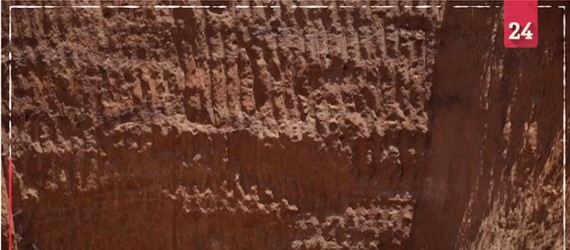When a team of archaeologists deep in the deserts of Sudan arrived at the ancient site of Jabal Maragha last month, they thought they were lost. The site had vanished.
“They had only one goal in digging here — to find gold,” said shocked archaeologist Habab Idriss Ahmed, who had painstakingly excavated the historic location in 1999.
In the baking-hot desert of Bayouda, some 270 kilometres (170 miles) north of the capital Khartoum, the team discovered two mechanical diggers and five men at work.
They had dug a vast trench 17 metres (55 feet) deep, and 20 meters long.
The rust-coloured sand was scarred with tyre tracks, some cut deep into the ground, from the trucks that transported the equipment.
The site, dating from the Meroitic period between 350 BC and 350 AD, was either a small settlement or a checkpoint. Since the diggers came, hardly anything remains.
– Escape justice –
Next to the huge gash in the ground, the diggers had piled up ancient cylindrical stones on top of each other to prop up a roof for their dining room.
The archaeologists were accompanied by a police escort, who took the treasure-hunters to a police station — but they were freed within hours.
Sudan’s archaeologists warn that this was not a unique case, but part of a systematic looting of ancient sites.
At Sai, a 12-kilometre-long river island in the Nile, hundreds of graves have been ransacked and destroyed by looters. Some of them date back to the times of the pharaohs.
Sudan’s ancient civilisations built more pyramids than the Egyptians, but many are still unexplored.
Now, in hundreds of remote places ranging from cemeteries to temples, desperate diggers are hunting for anything to improve their daily lives.
– Gold fever –
Sudan is Africa’s third largest producer of gold, after South Africa and Ghana, with commercial mining bringing in $1.22 billion to the government last year.
In the past, people also tried their luck by panning for gold at the city of Omdurman, across the river from Khartoum, where the waters of the White and Blue Niles meet.
Then in the late 1990s, people saw archaeologists using metal detectors for their scientific research.




